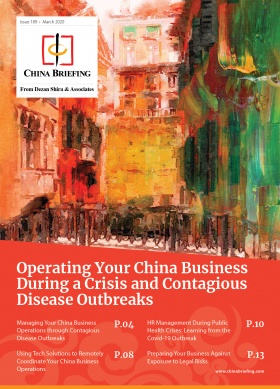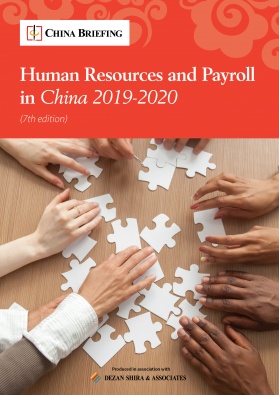How to Handle Your Foreign Employee’s Work and Residence Permit: China’s COVID-19 Travel Ban Series
Since March 28, 2020, China has suspended the entry of most foreign nationals, citing the temporary measure as a response to the rapid spread of COVID-19 across the world.
This means that foreigners who hold the following visas are currently not allowed to enter the country:
- Chinese visa;
- Residence permit;
- APEC business travel card; and/or
- Port visa (including various visa-free transit policies).
Due to these new travel restrictions, which so far have presented no expiration date, many foreign nationals who hold a residence permit in China for working purposes are stuck outside of China during this time.
Many companies are now grappling with new HR, legal, and tax uncertainties that have arisen within their foreign employment relationship in the context of these new travel restrictions.
In our experience, some of the issues that will typically surface are:
- How to pay overseas employee’s salary?
- How to reassess employee’s salary package?
- What to do if the work permit has expired or will expire soon?
- How to calculate tax liability and social insurance contributions during this time?
- How to adjust working hours and leave based on the employee’s individual circumstance?
In response to these issues, we have created a 3-part series answering some important questions:
- How Handle Your Foreign Employee’s Work and Residence Permit in China?
- How to Pay Your Foreign Employees Out of China?
- How to Determine Your Foreign Employees IIT Liability in China?
In this article, we will start by addressing the first question in the series: How to handle your foreign employee’s work and residence permit?
I. Checking the validity of existing work and residence permits
Foreign employees in China are required to hold a valid working permit and residence permit during the course of their employment.
An employee’s work permit is conditional upon their employment with the company in China.
A residence permit, on the other hand, gives foreigners the right to live in China and can be obtained by transferring the visa into the permit.
Normally, the work permit and residence permit will be valid for one year and the renewal application of work permit should be submitted to the decision-making authority – 30 days or more before the expiration date of the foreign employees’ work permit.
However, due to the travel restrictions that have been put into place, some work and residence permits will expire before the permit holder will be able to return and reapply, causing issues with the return of employees once the restrictions are lifted.
As the travel restrictions have left many foreign employees stranded, companies are being required to decide on how to handle the status of the employment of their foreign employees, choosing either to:
- Keep the labor relationship with the foreign employees and allow them to work remotely;
- Suspend the labor relationship with the foreign employees and reactivate the labor relationship once they come back to China; or
- Relocate the foreign employees from China to the headquarter office and terminate the contract in China.
If the employment with the Chinese company continues (even in the case of a suspension of the labor relationship), the work permit and residence permit will be valid for foreign employees who return to China to work after the travel restriction are lifted by Ministry of Foreign Affairs of the People’s Republic of China.
In some cases, the work permit and residence permit will still be valid after the travel restrictions have been lifted and the foreign employee will therefore be able to enter the country smoothly.
However, where this is not the case, employees will bear a significant risk of not being able to enter back into China immediately, following the ban lift, as a new work permit and residence permit will need to be applied for.
Those in the latter situation will need to prepare for longer than usual process times, accounting for the sudden wave of applications that will need to be processed as soon as the travel restrictions are lifted.
Due to the impact of the COVID-19 outbreak, the work permit renewal process is now available online via a newly-introduced ‘commitment system’ whereby the applicant makes a written letter by the Chinese company that all the information and documents submitted is real and the company would like to take responsibility in the event that is not the case. For those foreign employees who are stuck outside China, the application can be scanned and uploaded online, in order to complete the necessary process to obtain the work permit and residence permit renewal or cancellation application.
II. Cancelling your work and residence permits
If the employment between the company and the foreign employees has been terminated, the employer is obliged to cancel the work permit and residence permit for the foreign employees, according to the Administrative License Law of the People’s Republic of China and Article 41 under the Exit and Entry Administration Law of the People’s Republic of China, which reads, “Foreigners who work in China shall obtain work permits and work-type residence permits in accordance with relevant regulations.”
Similar to the renewal process, the cancellation process can now also be completed entirely online and will generally take 3-4 weeks to process.
III. Identifying your HR risks
For companies that have foreign employees stuck outside of China, it is necessary to consider the situation from a legal, HR, and tax perspective.
From an HR perspective, it is important for the employer and employee to review the work and residence permit and be clear about the exact date in which they will expire. Based on this, various scenarios should be worked through to determine the employment structure that works best for both parties.
Businesses should consult their local professional services advisor for guidance on the statutory legal and HR procedures under each situation.
Your professional services advisor can help you with preparing your legal documents, such as suspension agreement, termination agreement, resignation letter, salary restructuring/adjustment agreement, work permit and residence permit applications, or other amendments to the labor contract as per the option selected by the client.
For more information, please feel free to contact us at china@dezshira.com.
Explore Our Related China Business Insights
About Us
China Briefing is written and produced by Dezan Shira & Associates. The practice assists foreign investors into China and has done since 1992 through offices in Beijing, Tianjin, Dalian, Qingdao, Shanghai, Hangzhou, Ningbo, Suzhou, Guangzhou, Dongguan, Zhongshan, Shenzhen, and Hong Kong. Please contact the firm for assistance in China at china@dezshira.com.
We also maintain offices assisting foreign investors in Vietnam, Indonesia, Singapore, The Philippines, Malaysia, and Thailand in addition to our practices in India and Russia and our trade research facilities along the Belt & Road Initiative.
- Previous Article How to Legally Reduce Labor Costs in China During the Coronavirus Outbreak
- Next Article How Technology is Impacting UK-China Business Ties Under COVID-19











